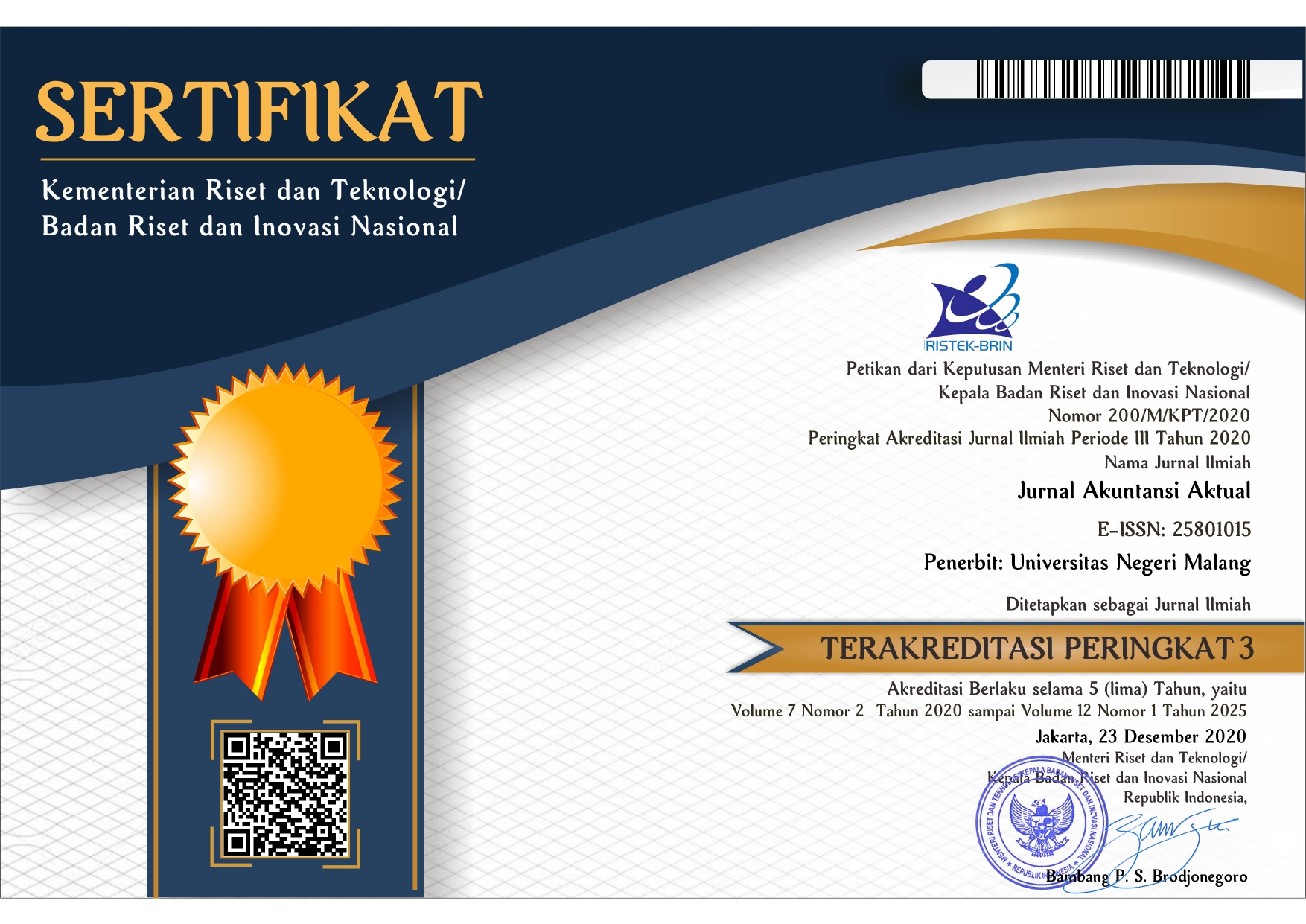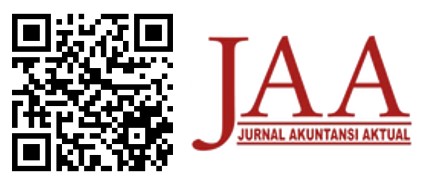A new paradigm of Luca Pacioli’s bookkeeping on blockchain phenomenon
Abstract
Abstract
The objective of this study is to examine the double and triple entry bookkeeping related to blockchain technology bookkeeping. The data we obtained for 30 articles from the database we searched for were provided by major publishers (Elsevier (www.sciencedirect.com), Emerald (www.emeraldinsight.com), Springer (www.springerlink.com), and Wiley (www. wiley.com)) and by service libraries (Complete Business Resources and Web of Science). We show the thoughts of philosopher Foucault regarding the power of knowledge, which will be associated with the phenomenon of the triple-entry and double-entry bookkeeping system paradigms. In addition, we document the blockchain technology has changed the paradigms of both bookkeeping systems. The novelty in this article is the implementation of the philosopher Foucault's thought in the paradigm of the triple-entry and double-entry bookkeeping systems. Our study contributes to expanding the existing literature by providing some arguments and findings regarding the blockchain bookkeeping systems and the future research agenda.
Abstrak
Tujuan dari penelitian ini adalah untuk mengkaji pembukuan double dan triple-entry yang terkait dengan pembukuan teknologi blockchain. Data yang kami peroleh adalah 30 artikel dari database penerbit besar (Elsevier (www.sciencedirect.com), Emerald (www.emeraldinsight.com), Springer (www.springerlink.com), dan Wiley (www.wiley.com)) dan dari perpustakaan layanan (Sumber Daya Bisnis Lengkap dan Web of Science). Kami tunjukkan pemikiran filsuf Foucault mengenai kekuatan pengetahuan, yang akan dikaitkan dengan fenomena paradigma sistem pembukuan triple-entry dan double-entry. Selain itu, kami mendokumentasikan teknologi blockchain telah mengubah paradigma kedua sistem pembukuan tersebut. Kebaruan dalam artikel ini adalah implementasi pemikiran filsuf Foucault dalam paradigma sistem pembukuan triple-entry dan double-entry. Studi kami berkontribusi untuk memperluas literatur yang ada dengan memberikan beberapa argumen dan temuan mengenai sistem pembukuan blockchain dan agenda penelitian di masa depan.
Keywords
Full Text:
PDFReferences
Bonsón, E., & Bednárová, M. (2019). Blockchain and its implications for accounting and auditing. Meditari Accountancy Research, 27(5), 725–740. https://doi.org/10.1108/MEDAR-11-2018-0406
Chowdhury, E. K. (2021). Financial accounting in the era of Blockchain - A paradigm shift from double entry to triple entry system. SSRN Electronic Journal. https://doi.org/10.2139/ssrn.3827591
Coyne, J. G., & McMickle, P. L. (2017). Can blockchains serve an accounting purpose? Journal of Emerging Technologies in Accounting, 14(2), 101–111. https://doi.org/10.2308/jeta-51910
Deloitte. (2016). Blockchain: A game changer for audit processes?: Deloitte Malta: Audit & Assurance. Deloitte Malta. Retrieved January 5, 2022, from https://www2.deloitte.com/mt/en/pages/audit/articles/mt-blockchain-a-game-changer-for-audit.html
Dyer, S. (2020). Double-entry bookkeeping. A Common-Sense Method of Double-Entry Bookkeeping on First Principles, 1–120. https://doi.org/10.4324/9781003050179-1
Faccia, A., Moşteanu, N. R., & Leonardo, L. P. (2020). Blockchain Hash, the missing axis of the accounts to settle the triple entry bookkeeping system. Proceedings of the 2020 12th International Conference on Information Management and Engineering. https://doi.org/10.1145/3430279.3430283
Faccia, A., & Mosco, D. (2019). Understanding the nature of accounts using comprehensive tools to understand financial statements. Financial Markets, Institutions and Risks, 3(3), 18–27. https://doi.org/10.21272/fmir.3(3).18-27.2019
Fink, A. (2010). Conducting Research Literature Reviews. From the Internet to Paper, third ed. SAGE Publications, Inc., Thousand Oaks.
Fraser, I. A. (1993). Triple-entry bookkeeping: A Critique. Accounting and Business Research, 23(90), 151–158. https://doi.org/10.1080/00014788.1993.9729872
Grigg, I. (2005). Triple Entry Accounting. Tribhuvan University Journal, 3(September), 1–15. https://doi.org/10.13140/RG.2.2.12032.43524
Grigg. (2007). The secret of double-entry bookkeeping: Personification of accounts. Proceedings of the Third International Economic Symposium (IES 2018). https://doi.org/10.2991/ies-18.2019.40
Gröblacher, M., & Mizdraković, V. (2019). Triple - entry bookkeeping: History and benefits of the concept. Proceedings of the 6th International Scientific Conference - FINIZ 2019. https://doi.org/10.15308/finiz-2019-58-61
Houghton, B.C. (2016). In the shoes of Luca Pacioli—double entry bookkeeping and Financial Literacy. International Handbook of Financial Literacy, 621–637. https://doi.org/10.1007/978-981-10-0360-8_39
Ibañez, J. I., Bayer, C. N., Tasca, P., & Xu, J. (2020). Rea, triple-entry accounting and blockchain: Converging paths to shared Ledger Systems. SSRN Electronic Journal. https://doi.org/10.2139/ssrn.3602207
Ijiri, Y. (1986). A Framework for Triple-entry Bookkeeping. The Accounting Review, Vol. LXI, No. 4, 745-759
____. (1989). Momentum Accounting and Triple-entry Bookkeeping: Exploring the Dynamic Structure of Accounting Measurements. Sarasota, United States of America: American Accounting Association
____. (1993). The Beauty of Double-entry Bookkeeping and its Impact on the Nature of Accounting Information. Economic notes: Economic Review of Banca Monte dei Paschi di Siena, 22 (2), 265-285
Jaya, A., Mamoto, C. J., & Sulhiyah, S. (2019). Konstruksi Identitas Diri Dalam Komik Ruronin Kenshin: Kajian Analisis Wacana kritis Michel Foucault. PHILOSOPHICA Jurnal Bahasa, Sastra, Dan Budaya, 2(2). https://doi.org/10.35473/po.v2i2.347
Kuznetsov, A. (2019). The secret of double-entry bookkeeping: Personification of accounts. Proceedings of the Third International Economic Symposium (IES 2018). https://doi.org/10.2991/ies-18.2019.40
Lee, L. S., Appelbaum, D., & Mautz III, R. (2021). Blockchains: an experiential accounting learning activity. Journal of Emerging Technologies in Accounting. https://doi.org/10.2308/jeta-2020-009
Libby, R. (2017). Financial Accounting Financial Accounting, 4–15. https://doi.org/10.4135/9781446214688.n1
Littell, J.H., (2008). Systematic Reviews and Meta- Analysis. Oxford University Press, USA.
Liu, M., Wu, K., & Xu, J. J. (2019). How will blockchain technology impact auditing and accounting: Permissionless versus permissioned blockchain. Current Issues in Auditing, 13(2). https://doi.org/10.2308/ciia-52540
Mawardi, A. I. (2020). Charles Wright mills dan teori power elite: Membaca Konteks dan pemetaan teori sosiologi politik tentang kelas elite kekuasaan. Jurnal Sosiologi Pendidikan Humanis, 4(2), 73. https://doi.org/10.17977/um021v4i2p73-83
Melse, E. (2010). Accounting for trends : Relevance, explanatory and predictive power of the framework of triple-entry bookkeeping and momentum accounting of Yuji Ijiri. https://doi.org/10.26481/dis.20081003em
Metzger, J. (2019). Gabler Wirtschafslexikon. Retrieved from Distributed Ledger Technologie (DLT): https://wirtschafslexikon.gabler.de/defnition/distributed-ledger-technologie-dlt-54410
Mitschele, P. D. (2019). Gabler Wirtschafslexikon. Retrieved from Smart Contract: https://wirtschafslexikon.gabler.de/defnition/smart-contract-54213
Moher, D., Pham, Klassen, T. P., Schulz, K. F., Berlin, J. A., Jadad, A. R., & Liberati, A. (2000). What contributions do languages other than English make on the results of meta-analyses? Journal of Clinical Epidemiology, 53(9), 964–972. https://doi.org/10.1016/S0895-4356(00)00188-8
Mudhoffir, A. M. (2013). Teori kekuasaan Michel Foucault: Tantangan Bagi Sosiologi Politik. MASYARAKAT: Jurnal Sosiologi, 18(1). https://doi.org/10.7454/mjs.v18i1.3734
Needles, B.E., Powers, M., (2012). Financial Accounting Financial Accounting. https://doi.org/10.4135/9781446214688
O'Bryan, D., Berry, K. T., Troutman, C., & Quirin, J. J. (2000). Using accounting equation analysis to teach the statement of cash flows in the First Financial Accounting Course. Journal of Accounting Education, 18(2), 147–155. https://doi.org/10.1016/s0748-5751(00)00010-5
Pacioli, L. (1494). Retrieved January 5, 2022, from https://www.icaew.com/library/library-collection/historical-accounting-literature/highlights-of-the-collection/summa-di-arithmetica
Perez, D., Xu, J., & Livshits, B. (2020). Revisiting transactional statistics of high-scalability blockchains. Proceedings of the ACM Internet Measurement Conference. https://doi.org/10.1145/3419394.3423628
Platonova, N. (2016). Partie triple. Dictionnaire Historique De Comptabilité Des Entreprises, 394–398. https://doi.org/10.4000/books.septentrion.20014
Qu, S. Q., & Dumay, J. (2011). The qualitative research interview. Qualitative Research in Accounting and Management, 8(3), 238–264. https://doi.org/10.1108/11766091111162070
Schmitz, J., & Leoni, G. (2019). Accounting and auditing at the time of Blockchain Technology: A research agenda. Australian Accounting Review, 29(2), 331–342. https://doi.org/10.1111/auar.12286
Spiceland, J. D., Thomas, W., & Herrmann, D. (2010). Financial accounting. McGraw-Hill Education.
Sullivan, M. C., & Benke, R. L. (1997). Comparing introductory financial accounting textbooks. Journal of Accounting Education, 15(2), 181–220. https://doi.org/10.1016/s0748-5751(97)00005-5
Sumi, Y., & Noguchi, M. (2021). The use of accounting information for the Sugar Business Operations of the south seas development company. Labor History, 1–23. https://doi.org/10.1080/0023656x.2021.1931828
Syafiuddin, A. (2018). Pengaruh Kekuasaan Atas Pengetahuan (memahami teori Relasi Kuasa Michel Foucault). Refleksi: Jurnal Filsafat Dan Pemikiran Islam, 18(2), 141. https://doi.org/10.14421/ref.2018.1802-02
Tranfield, D., Denyer, D., & Smart, P. (2003). A systematic review of literature on offshoring of value chain activities. Journal of International Management, 19(4), 390–406. https://doi.org/10.1016/j.intman.2013.03.011
Van, H. S. (2020). Blockchain in business. Decoding Blockchain for Business, 1–36. https://doi.org/10.1007/978-1-4842-6137-8_1
Walker, S. P. (2016). Revisiting the roles of accounting in Society. Accounting, Organizations and Society, 49, 41–50. https://doi.org/10.1016/j.aos.2015.11.007
Warren, C., Reeve, J.M., Duchac, J., 2018. Financial Accounting. McGraw-Hill Higher Education.
Weigandt, J.J., Kieso, D.E., Kimmel, P.D. (2017). Financial Accounting. Wiley
Wild, J. (2017). Fundamental Accounting Principles. McGraw-Hill Higher Education
Williams, J. (2018). Financial Accounting. McGraw-Hill Higher Education.
Xiao, Y., & Watson, M. (2019). Guidance on Conducting a Systematic Literature Review. Journal of Planning Education and Research, 39(1), 93–112. https://doi.org/10.1177/0739456X17723971
Yamey, B. S. (2005). The historical significance of double-entry bookkeeping: Some non-Sombartian claims. Accounting, Business & Financial History, 15(1), 77–88. https://doi.org/10.1080/09585200500033089
Zaid, O. A. (2000). Were Islamic records precursors to accounting books based on the Italian method? Accounting Historians Journal, 27(1), 73–90. https://doi.org/10.2308/0148-4184.27.1.73
DOI: http://dx.doi.org/10.17977/um004v10i12023p052
Refbacks
- There are currently no refbacks.

This work is licensed under a Creative Commons Attribution-ShareAlike 4.0 International License.
Jurnal Akuntansi Aktual is indexed by:















